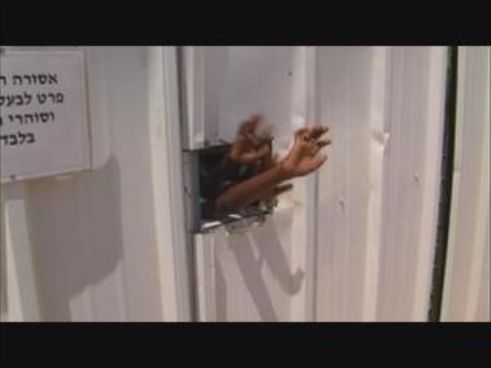Refugees

Full Description
Over the past two years, 8,000 refugees, mostly from war-ravaged African regions including Darfur and southern Sudan, have risked their lives to cross into Israel via Egypt in search of asylum. The Israeli government has accepted 500 as legitimate, busing the remainder back to Egypt and to unknown fates. Filmmaker Shai Carmeli Pollak (Bilin My Love, SFJFF 2008) brings us the deeply personal stories of those who have fallen through the cracks in humanitarian responsibility. Combining interviews and news footage with guerilla-style camera tactics, Carmeli Pollak takes us beyond the poised politicians who call the refugees “infiltrators,” past the frustrated social workers with no food or housing to offer, and into the lives of the refugees themselves. Among those we meet is Adam, an English teacher from Darfur who arrived with only his wife’s handbag—a sobering reminder that his wife and children, who did not make it past the border, are imprisoned in Egypt. This powerful documentary asks whether a country built on the premise of welcoming refugees has a special moral obligation to accept immigrants today, despite very different practical and economic conditions. The parallels to the United States’ own immigration conundrums are lurking just beneath the surface of the film’s humane portrait of a pressing global problem.
—Shira Zucker
Filmmaker Bio(s)
From 2008 Festival: Director, Israel
Biography:
Shai Carmelli Pollak was born in 1968 and grew up in Jaffa. He is a graduate of the Film & Television Faculty at Tel Aviv University. He is both a director and writer. His work includes: the Zbeng series for youth, the animated series Zolgar and Pupkin Conquer the World, and the drama Abrahmov. For the past four years Carmeli-Pollack has documented and took part in the struggle against the separation Fence. Bilin My Love (Bil’in Habibti) is his first documentary film.
Director's statement:
"I did not come to Bil’in as a filmmaker, but as an activist, to take part in the protest against the land theft caused by the separation barrier.
For a year and a half, I used my camera to document the moments of despair and hope, danger and courage and the birth of true partnership between Palestinians and Israelis. During this period the village has become a symbol of the joint struggle against the barrier and the occupation."
Director(s)
Country(ies)
Language(s)
Release Year
Festival Year(s)
Running Time
76
Writer(s)
Cinematographer(s)

